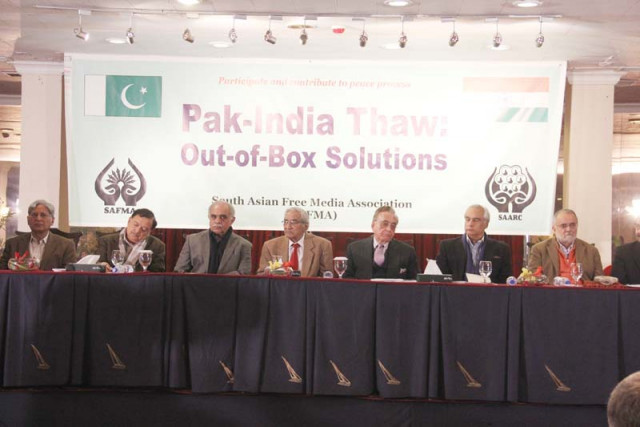Lasting peace: ‘Governments change policies, establishments resist’
Speakers at SAFMA conference call for uninterrupted dialogue

Senator Aitezaz Ahsan (left) listens to participants of the conference (right). PHOTOS: AYESHA MIR/EXPRESS
The key to lasting peace between India and Pakistan was allowing an uninterrupted dialogue between the two countries, speakers at a conference titled Indo-Pak Thaw: Out-of-the-Box Solutions said on Sunday.
The conference was organised by the South Asian Free Media Association.
Journalist Ahmed Rashid spoke of Pakistan’s role in the region and its importance in maintaining peace with India. “If you are not successful in your region, then you cannot be successful globally,” he said.
Commenting on Afghanistan, he said it was impossible to “make India run away from Afghanistan.”
Instead, he said, Pakistan and India should demarcate and agree over separate areas of interest in the country. He said both countries could also share influence in central Asia.
He said it was a misconception that China would help Pakistan defeat India. “India is China’s largest trading partner and China’s strategic interest and alliance with Pakistan is not enough to overturn the momentum of trade between the two countries,” he said.
Senator Aitezaz Ahsan said war was clearly not the solution since it had not helped Pakistan win against India. He said the 1965 war was meant to free Indian-occupied Kashmir, but Pakistan had failed on that account.

In Kargil, he said, the idea had been to give Pakistan an upper hand for negotiations which had also failed. “In 1971, the military actually gave up arms.”
Ahsan made an economic case for peace with India, saying the Indian economy was seven times the size of Pakistan’s.
He said it was not only an opportunity for Pakistani’s to acquire cheap items but also growth for textile and surgical industries products.
Addressing the conference, SAFMA president Imtiaz Alam said, “The response from both sides of the border following the attack on the Indian air force in Phatankot was not reactionary. Instead, it was decided that information regarding the attack would be shared. This is a positive development.”
Alam said despite various peace and cooperation agreements signed between the governments, talks at bureaucratic levels broke down whenever tensions escalated.
He said General (r) Pervez Musharaff’s regime had come close to reaching a solution on the Kashmir issue with India.
“To ensure lasting peace, both countries must realise that they won’t get everything they want,” he said. “Yet, lasting peace is vital and some consensus must be evolved,” he said.
“The paradigm that shapes India-Pakistan relations should change from enmity to peace,” he said. “Hatred towards the other is rampant in the concept of nationalism in both countries.
Khurshid Kasuri, foreign minister under Musharraf’s rule, said when he was leaving office, he had ensured that records of all proceedings under Musharaff reached President Zardari.
He said the PPP had pursued the same formula for a solution to Kashmir.
He said at the time, it was impossible for then Indian prime minister Manmohan Singh to approach the process without having the Indian intelligence and military on board.
“Governments often change their point of view due to political considerations but establishments don’t change them so frequently,” he said.
He said after fighting five wars, it was apparent that the only solution for Pakistn and India was through a comprehensive dialogue.
“Whenever there is a glimmer of hope from meetings and discussions, and a solution seems inevitable, something would happen that derailed the process.”
Shahid Malik, a former high commissioner to India, said in a meeting in January 2007, former president Musharraf had made it clear that Pakistan’s goal was to ensure Kashmiri’s right to self-determination.
He said after Modi had visited Pakistan, it was decided that foreign secretaries of the two countries would meet on January 15. “But before that, the Indian air force base in Pathankot was attacked. This is all too familiar for me,” he said.
This time, he said, the response had been positive. He said it was important to maintain the momentum of the past few weeks.
Toseef Ahmed, an academic from LUMS also made a case for trade between the two countries saying it was mutually beneficial.
General (R) Ghulam Mustafa said war was necessary to create a balance which would allow for favourable conditions for either country through negotiations.
A resolution was passed at the end of the conference to pursue a peace process with India.
Published in The Express Tribune, January 25th, 2016.



















COMMENTS
Comments are moderated and generally will be posted if they are on-topic and not abusive.
For more information, please see our Comments FAQ